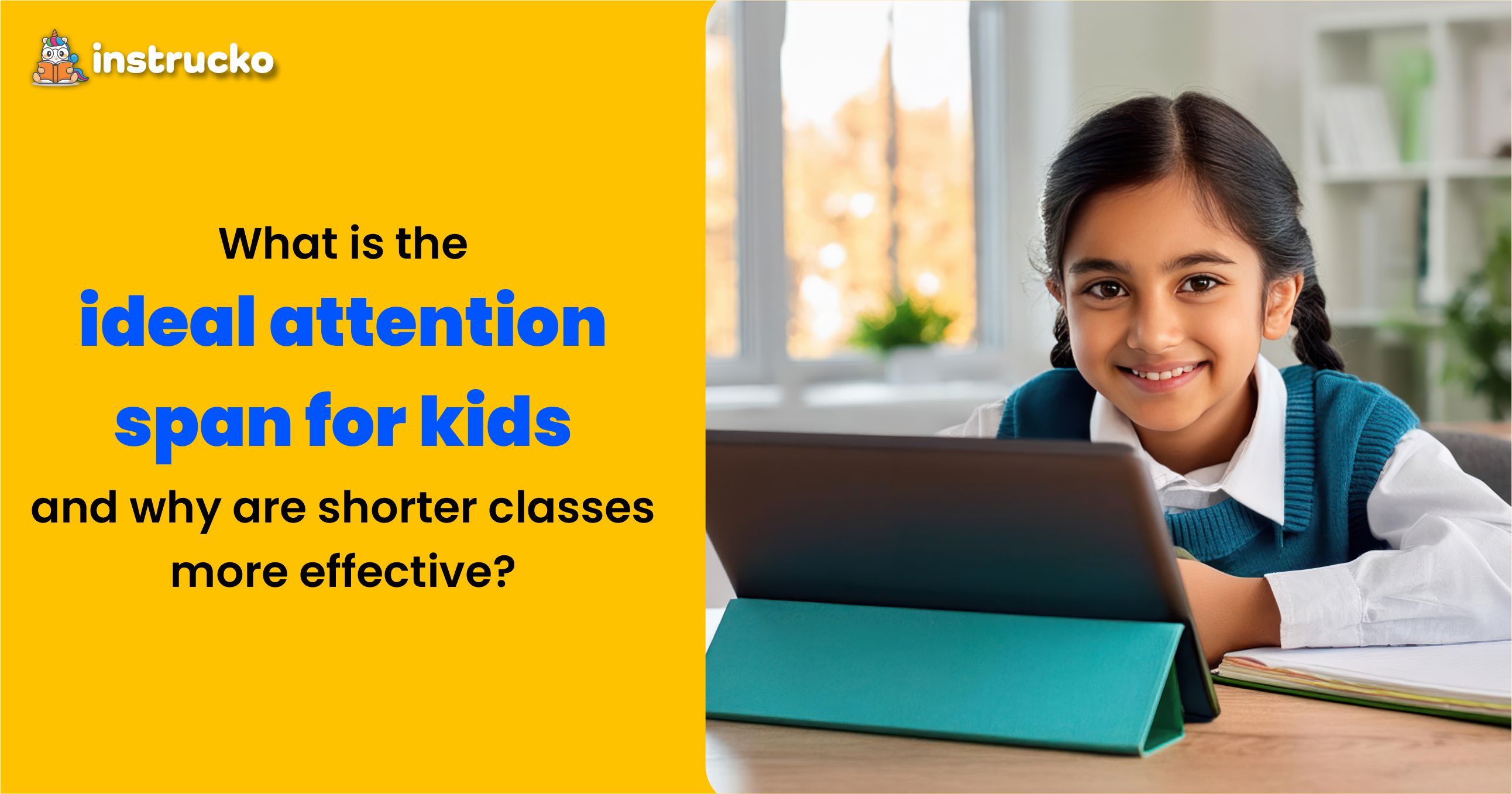Introduction
Have you ever noticed how quickly children get distracted, especially during study time? One moment they are fully engaged, and the next, they are looking around, tapping their pencil, or staring out of the window. This isn’t just a lack of interest—it’s how young minds naturally function.
Scientific studies have consistently shown that a child’s attention span is limited and that long, monotonous lessons lead to fatigue, decreased retention, and loss of engagement. That’s why short-duration classes, like those offered by instrucko, align perfectly with how young brains learn best. Our live 30-40 minute online sessions are designed to keep children engaged, ensure better retention, and make learning enjoyable.
In this blog, we’ll explore scientific research on attention spans, why shorter study sessions are more effective, and how instrucko’s structured approach enhances learning outcomes for children.
Understanding kids' attention span
What is attention span?
Attention span refers to the length of time a person can focus on a particular task before becoming distracted. For children, this is naturally shorter due to their developing brains and high energy levels.
How does attention span change with age?
Research suggests that a child’s attention span increases as they grow, but it still varies depending on factors such as interest in the subject, environment, and teaching methods.
A widely accepted formula used by educators states that a child’s attention span is approximately 2 to 5 minutes per year of age (Hartley & Davies, 1986).
Ideal attention span for different age groups
3-5 years → 6-15 minutes
6-8 years → 12-20 minutes
9-12 years → 20-30 minutes
13-15 years → 30-40 minutes
💡 Scientific Insight: A study published in the journal Frontiers in Psychology (2017) found that children’s ability to focus declines significantly after 30 minutes of continuous learning, reinforcing the need for short, structured lessons.
Why long study sessions don’t work for kids
1. Cognitive fatigue & reduced retention
The brain experiences cognitive overload after prolonged focus, leading to diminished memory retention. Research by John Sweller on Cognitive Load Theory suggests that when too much information is processed at once, learning efficiency drops (Sweller, 1988).
2. Loss of interest & engagement
Children thrive on variety and interaction. A study by the National Institutes of Health (NIH) found that sustained attention in young learners peaks at 30 minutes before engagement declines (Rueda et al., 2004).
3. Increased distractions & restlessness
Extended study sessions can cause children to become fidgety, distracted, and mentally exhausted. Harvard University research on learning behaviour highlights that movement and interactive breaks boost focus in young learners (Ratey, 2008).
Why shorter study sessions are the best approach
1. Improves focus & concentration
Short lessons allow children to stay engaged without mental exhaustion. Research from the University of Illinois confirms that brief breaks help sustain concentration longer (Lleras, 2016).
2. Enhances knowledge retention
Dividing information into smaller learning chunks improves retention—a method called spaced learning. A study published in Applied Cognitive Psychology (Karpicke & Roediger, 2008) showed that spaced repetition leads to significantly better recall than massed learning (long study hours).
3. Encourages active participation
Short, structured lessons encourage children to ask questions, interact, and discuss concepts without feeling overwhelmed.
4. Reduces stress & fatigue
A study from the Journal of Educational Psychology (2019) found that students in shorter sessions reported lower stress and higher enthusiasm for learning.
The science behind short learning sessions
Many time management techniques, such as the Pomodoro Technique, use short bursts of study followed by brief breaks to optimise focus and retention.
💡 Scientific Backing: A study conducted by the National Center for Biotechnology Information (NCBI) found that students who engaged in 30-minute learning blocks performed significantly better in tests compared to those in longer sessions (Mehta et al., 2020).
How instrucko’s 30-40 minute classes maximise learning
✅ Live Online Classes for Kids Aged 3-15
instrucko’s lessons are designed to fit children’s natural attention span, making learning fun and effective.
✅ Engaging & Interactive Teaching Methods
Our classes include storytelling, role-playing, games, and discussions to keep children actively involved.
✅ Balanced Duration for Maximum Learning
Our 30-40 minute classes ensure that young learners:
✔ Stay focused
✔ Retain knowledge effectively
✔ Enjoy the learning process
✅ Flexible & Distraction-Free Learning
With online learning, children can study in a comfortable environment, minimising distractions often found in traditional classrooms.
Tips for parents to support kids' learning at home
📌 Create a Quiet Study Space – Minimise distractions to help kids concentrate.
📌 Encourage Short Breaks – Brief pauses refresh the mind and improve focus.
📌 Use Interactive Learning Tools – Flashcards, quizzes, and educational games make learning more engaging.
📌 Follow a Structured Routine – Consistency helps children develop better learning habits.
Debunking common myths about short study sessions
❌ Myth 1: "Longer study hours mean better learning"
✅ Truth: Quality over quantity. Kids retain more from short, structured lessons than from long, monotonous ones.
❌ Myth 2: "Short classes don’t cover enough material"
✅ Truth: Shorter classes prioritise key concepts, ensuring better understanding and retention.
❌ Myth 3: "Short attention spans are a problem"
✅ Truth: Short attention spans are natural in kids. Matching lessons to their focus levels improves learning outcomes.
Real-life success stories with short-duration classes
🎓 Kiyara (7 years old) – From struggling to thriving
Kiyara found it hard to concentrate in long classes. After switching to instrucko’s 30-minute live sessions, she became more engaged and started enjoying learning.
🎓 Aarav (12 years old) – Higher retention, better grades
Aarav’s parents noticed a significant improvement in his academics after he moved to shorter, interactive lessons.
Conclusion
Scientific research confirms that shorter, well-structured study sessions are far more effective than long ones. By aligning learning with a child’s natural attention span, we can ensure higher engagement, better retention, and improved learning outcomes.
instrucko’s 30-40 minute live classes are carefully designed to maximise focus, interaction, and knowledge retention, helping children develop a lifelong love for learning.
FAQs
🔹 What is the ideal class duration for kids?
Studies suggest 30-40 minutes is the most effective duration for young learners.
🔹 Do short classes really improve learning?
Yes! Research proves that short, interactive lessons enhance understanding and memory retention.
🔹 How can I help my child concentrate during online classes?
Minimise distractions, ensure an engaging environment, and encourage participation.
🔹 Are online classes as effective as traditional classrooms?
Absolutely! Live online classes provide flexibility, personalisation, and interactive methods that suit children’s learning styles.
🔹 How do I know if short study sessions are working for my child?
If your child is more engaged, retains knowledge better, and enjoys learning, then short classes are the perfect fit!










